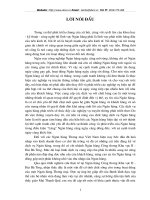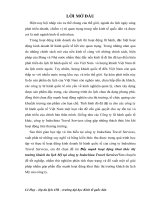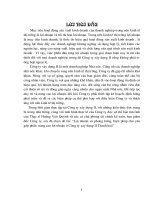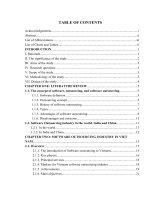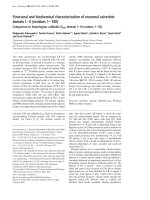II travel today situation analysis 259007 (100)
Bạn đang xem bản rút gọn của tài liệu. Xem và tải ngay bản đầy đủ của tài liệu tại đây (91.7 KB, 14 trang )
Running head: TRAVEL TODAY’S SITUATION ANALYSIS
Travel Today’s Situation Analysis
Nguyen Quynh Nhu
Columbia Southern University
1
TRAVEL TODAY’S SITUATION ANALYSIS
2
Literature Review
Marketing has become increasingly important for a business's success. Good marketing
activities create demand for products and services in order for the firm to make a profit and build
a strong brand name and loyal customer base that constitute the company value. Marketing
strategy shall decide designs, features, price, targeted customers, places to sell products and
services, and the budget for advertising campaigns based on careful analyses on market,
customers, economic and political situation, future trends, etc. [CITATION Phi12 \p 3-5 \l 1033 ]
There are two schools of marketing (two marketing concepts): the classic marketing concept and
the holistic marketing concept.
The classic marketing concept is based on customer-centered philosophy; the company
shall find right products for customers such as Dell, therefore the company following marketing
concept tends to provide customers to design their product or service. The key to achieving
organizational goals in classic marketing concept is being more effective than competitors.
[CITATION Phi12 \p 18 \l 1033 ].
The holistic marketing concept refers to internal marketing, integrated marketing,
performance marketing, and relationship marketing. Internal marketing mentions the task of
hiring, training, and motivating employees in order to serve customers well. Integrated marketing
is the creation of marketing activities and marketing programs to create, communicate, and
deliver value to consumers. Performance marketing requires the understanding of financial and
nonfinancial issues in order to build an effective marketing strategy. Relationship marketing
aims to build and maintain long-term relationships with key constituents such as customers,
employees, marketing partners such as channels, suppliers, distributors, dealers, agencies, and
financial community such as shareholders, investors, analysts in order to retain their business.
TRAVEL TODAY’S SITUATION ANALYSIS
3
The holistic marketing concept is more suitable with the current fierce competitive economy
[CITATION Phi12 \p 19-22 \l 1033 ].
Company Overview
Travel Today Ltd. is a travel corporation based in Ho Chi Minh City, Viet Nam since
1991. Travel Today Ltd. has 30 representative offices across Viet Nam and oversea representative
offices in the USA, Australia, Thailand, Japan, Korea, China, and Cambodia.
Travel Today Ltd. is a member of Pacific Asia Travel Association (PATA), Japan
Association of Travel Agents (JATA), United States Tour Operators Association (USTOA), and
Viet Nam Society of Travel Agents (VISTA).
Travel Today Ltd. offers inbound and trans-boundary travel arrangements for
international customers including domestic and trans-boundary package tours such as caravan,
cultural, medical, sea diving, mountain climbing tours, etc. Travel Today Ltd. also offers flights
booking, car rental, accommodations, tailor-made trips at clients' requirements, travel insurance,
visa assistance, and foreign currency exchange for all inbound and outbound customers. The
company’s mission is introducing Viet Nam to the rest of the world and making Vietnam to be
the world's attracting destination. The company aims to increase the number of international
visitors by 5% per year by increasing visitors' satisfaction.
Market Research Strategy
After 25 years of operation, Travel Today Ltd. has become a famous trademark offering
domestic and trans-boundaries tours for group of foreign tourists. In recent years, the company
has experienced a slowdown in business because of the outbreak of travel companies in Viet
Nam, the drop in the number of international tourists to Vietnam, and changes in customer’s
behaviors; they are using the Internet to plan and book their own vacations. Therefore, the
TRAVEL TODAY’S SITUATION ANALYSIS
4
company has to research possible alternatives for new products and services in order to recapture
lost customers and attract more international customers. The classic marketing concept that was
used successful in the past, may not suitable in present period when the company is facing cost
competitiveness. In order to create new products and services and an effective marketing plan,
the company shall implement company's situation analyses including a macro-environment
analysis (PEST), a segmentation & target market analysis, a competitive analysis, and a SWOT
analysis.
The PEST analysis shall be made based on information and figures from relevant
Governmental official websites. PEST analysis helps identify political, economic, social-cultural,
and technical issues (macro-economic factors) that may affect tourism industry and the
company’s activities [ CITATION Kie16 \l 1033 ]. The segmentation and target market analysis
help a company understand the behavioral, psychographic, demographic, and geographic criteria
then select its targeted markets correctly[CITATION Ann16 \l 1033 ]. Competitive analysis help
understand the rivals. Eventually, the SWOT analysis identifies company's strengths,
weaknesses, opportunities, and threats in order for the company to take advantage of company's
strengths and economic opportunities as well as improve company's weaknesses and prepare for
threats.
Situation Analysis
Analyzing Macro-environment-PEST Analysis
Viet Nam has many attractive locations that support a diverse tourism industry suitable
with a variety of purpose such as historical, cultural, adventure, discovery, leisure or business
tourism such as meeting and convention, incentive travel, exhibition and event, etc. The
Vietnamese government considers the tourism industry a key sector to promote Viet Nam
TRAVEL TODAY’S SITUATION ANALYSIS
5
economic and social development, thus, some encouraging plans and policies for tourism
industry were gradually implemented. However, Vietnam's tourism industry still has implicit
difficulties, challenges, and opportunities. The quantity of international visitors had increased
over the past ten years, but the trend was not clearly stable during the period and the growth rate
is increasingly lower than other countries in the region. For example, during 2014-2015, growth
rate of international visitors in the region are: Vietnam, 0.88%; Thailand, 20.5%; Malaysia,
6.3%; Indonesia, 10.3%; Japan, 47.1%; China, 2.3% [CITATION UNW16 \l 1033 ].
International visitors to Viet Nam
2006-2016
12,000,000
10,000,000
8,000,000
6,000,000
4,000,000
2,000,000
0
06
20
07
20
0
20
8
0
20
9
10
20
11
20
12
20
13
20
1
20
4
15
20
1
20
6
st.
(E
)
[ CITATION Vie16 \l 1033 ]
The macro-environment-PEST analysis is a marketing research tool using for identifying
macro issues that may affect the industry that the entrepreneur
Political
Issues
The ongoing territorial dispute over the East Sea between
Vietnam and China.
Political instability in neighboring countries (Thailand,
Cambodia, China, etc.)
Lack of international representation
Hotel industry getting government incentives
TRAVEL TODAY’S SITUATION ANALYSIS
Economic
Political instability
Visa procedures are still complicated, insufficient visa-free
policies limits the entry of international tourists.
International agreements enter into force
Improving visa-free policies for visitors from develop
countries
The launch of new international and domestic routes, the
increase in cheap international and domestic flights, the
tourism stimulation programs, and the increase in frequency
of key routes
Average disposable income increases
Improved transport infrastructure
Increasing low-cost airlines, increasing air-travelers
Travel expenses fell sharply compared to five years ago
thanks to increasing cheap airlines, easy-visa and visa-free
policies, online tools, fierce competitiveness, etc.
Privatization policies are improving quality of service.
Increasing presence of world famous brands
Potential domestic market with various scenic beauty with
beaches, forest, river system; varied cultures; diverse
Socio-cultural
cuisines;
Glorious sceneries, some of them were recognized by
UNESCO.
Travel blogging movement flourished worldwide
Photography trend to share on social network such as
instagram, facebook, zalo, etc.
Adventure travelling trends in young generation;
Many festivals a year
Increasing evils in some countries
Illegal tour guides offer cheap prices
Consumers become wiser thank to internet
Majority of local people cannot use English frequently
Poor local services
6
TRAVEL TODAY’S SITUATION ANALYSIS
Technical
UNESCO recognized intangible heritages
Vietnamese people do not pay enough attention to
environmental issues
The growth of e-commerce and social networks: online
booking services, online service flat forms
Poor technical infrastructure, poor facilities at airports and
7
stations
Segmentation and Target Market Analysis
Behavioral, Psychographic, Demographic, and Geographic analysis
In the first month of 2016, most tourists to Viet Nam are from Asia countries (accounts
for 65.3%), followed by EU (19.13%), Americas (9.48%), Australias (5.74%), and Africas
(0.36%). By country, most tourists to Viet Nam are from Korea, followed by China, Japan, USA,
Australia, and Taiwan [CITATION Van16 \l 1033 ].
According to Nguyen, Le, Duong’s research (2015) with regard to age, marital
status, and education had found that the majority of interviewed tourist is
19-29 years old (62.9%), followed by 30-39 years old (25.6%); 90% of
interviewees are highly educated; 77.3% are single respondents; 38.4% are
students, 15.9% is professional and 9.7% are managers; 66% are first visit
and 34.2% are repeated visit. Regarding to the travel partner, 60.8% travel
to Viet Nam with spouse/ girlfriend/ boyfriend/co-workers/classmates. Most
travelers to Vietnam are attracted by the country’s wonderful natural beauty.
Most amazing attractions in Vietnam recognized by international tourists: Ho
Chi Minh, Ha Noi, Hoi An Old Town, and Ha Long Bay [CITATION Min15 \l
1033 ].
TRAVEL TODAY’S SITUATION ANALYSIS
8
The biggest spender is China, focusing on shopping rather than discovering and
sightseeing. The second and third spenders are the United States and Germany [ CITATION
Wor \l 1033 ]. The majority of customers travels with spouse, family, and friends. Most popular
resources for tourists to seek advices and travel information are friends in person, followed by
social media and internet, travel agency, print magazines, travel website, etc. [ CITATION
Ins15 \l 1033 ]. The biggest difficulty for international is the complicated and slow visa
procedures.
Targeted Market
The company used to focus on middle-class and middle-age tourists who were willing to
pay more for a convenient tour including a well-prepared itinerary, luxury accommodations,
comfortable transportation means, knowledgeable tour guides, etc. Nowadays, the trend has
changed. The customers become younger and they prefer discovering new lands and outdoor
activities to joining convenient tour. They are willing to spend more money for wild, natural, and
cultural experiences rather than enjoying luxury and comfortable things. However, convenient
tours still remain a profitable product lines because it is suitable for those who don’t have enough
time for researching and discovering.
The company focuses on:
25-29 years old: they are young people who love to discover new lands and
outdoor activities, this group suitable with tailor-made trips and team building
activities.
30-45 years old: this group prefers convenience and does not like the element of
surprises, this group is suitable with designed tours.
Couples, group of friends, and family.
Top countries likely visit Viet Nam: USA, Japan, South Korea, Taiwan,
Singapore, France, UK, and Australia.
TRAVEL TODAY’S SITUATION ANALYSIS
9
Countries likely visit Viet Nam in the future: Thailand, Europe.
Competitive Analysis
The majority of market structure is shared by four big companies: Saigon Tourist, Viet
Travel, Fiditour, and Travel Today [CITATION ToN15 \l 1033 ]. Saigon Tourist holds biggest
part of market share, 38%. Travel Today is on the third with 19% of market share. The second
and the forth company are Viettravel (21%), and Fiditour (14%).
Saigon Tourist focuses on both inbound and outbound customers. Most of its sales come
from domestic visitors including visitors traveling domestically and overseas. Its outstanding
strengths is organizing group tours, the international segment of Saigon Tourist only a negligible
proportion. Saigon Tourist is a state-owned company to operate efficiently. However, the stability
of earnings and revenue will lead to the situation of sleeping on the victory. If they do not
promote creativity and innovation, they will be overtaken by rivals, especially when the support
elements for a state company are no longer [ CITATION ToN15 \l 1033 ].
Vietravel focuses on domestic customers buying oversea tours. It aims to build a better
brand experience for individual customers. Vietravel is implementing low-cost strategy.
However, the most sales of Viettravel come from international customers, the segment that the
company pay less attention to [ CITATION ToN15 \l 1033 ].
TRAVEL TODAY’S SITUATION ANALYSIS
10
Tourism industry market share
Other;
8.00%
Fiditour;
14.00%
Travel
today;
19.00%
Saigon
Tourist;
38.00%
Viettravel;
21.00%
Fiditour's
strategy is a combination of Saigon Tourist's and Viet Travel. Most of Fiditour’s revenue come
from selling air tickets and hotel bookings. Fiditour is facing a fierce competition with the
majority of tourist companies which are now leading to a reduction in prices and losing market
share[ CITATION ToN15 \l 1033 ].
SWOT Analysis
Strengths
Weaknesses
25-year experience
One of the top leading tourism
Local partner’s staffs may not speak
companies
Recognizable brand name
Member of international and domestic
English
Lack of innovation
Cumbersome management apparatus
increases costs and become a financial
travel associations
Long-term relationship with customers
and suppliers
Varied product’s price lines suitable
with different group of customers
problem in difficult economic periods
TRAVEL TODAY’S SITUATION ANALYSIS
Available domestic and international
representative office
Negotiation power
Opportunities
11
Threats
WTO agreement enters into force
Insecurity of other countries
Glorious sceneries
Crowded population and standard of
living improved
Visa-free to South Asian countries
Easy-visa policy to Japan, Taiwan,
Many domestic competitors
Many potential international
competitors
Effects of world economic crisis
Low awareness of environment leads
to many pollution issues
Korea, etc.
Conclusion
Tourism is one of the most sophisticated industry. It reflects and is impacted by
complicated factors such as social, cultural, economic and political environment. The South East
Asian tourism industry possesses an enormous diversity potentials that has been increasing
rapidly and is estimated to grow further. Sustainable tourism would be a very potential segment
in the near future thanks to the world's attention to environmental issues and cultural heritage.
The trans-boundary cooperation between South East Asian countries in tourism industry can
attract more visitors from other continents because it saves time and provides a connected and
diverse routes.
Vietnamese tourism is famous for political stability, tropical landscapes and cultural
heritages. The State's encouraging policies and the effect of international trade agreements not
only provide many opportunities for business but also increases fierce competition. Service
quality and innovative products are still the biggest weaknesses of domestic tourism industry. In
order to survive and grow, the company should focus on enhancing its core competencies and
TRAVEL TODAY’S SITUATION ANALYSIS
innovation ability. In the current situation, this is an appropriate opportunity for expanding
market share. It would be the best way to enhance Travel-Today's business as well as build a
solid foundation for future competition.
12
TRAVEL TODAY’S SITUATION ANALYSIS
13
References
Frue, K. (2016). Pestle analysis. Retrieved from />Hanlon, A. (2016). The Segmentation, Targeting and Positioning model. Retrieved from
/>Huy, V. (2016). Du khach nuoc nao den Viet Nam nhieu nhat [What country has the most tourists
to Viet Nam in January, 2016?]. Retrieved from Bao moi news:
/>Insights into travellers. (2015). Retrieved from />Kotler, P., & Keller, K. L. (2012). Marketing Management. Harlow: Pearson Education Limited.
Nguyen, M. H., Le, M. H., & Duong, T. M. (2015). Destination choice of international tourists
in Vietnam. Retrieved from />%20tourists%20in%20Vietnam.pdf
To, N. P. (2015). Phatmarcom. Retrieved from />UNWTO Tourism Highlight. (2016). Retrieved from />Vietnam National Administration of Tourism. (2016). Retrieved from Tourism statistic:
/>World tourism organization. (n.d.). Retrieved from />
TRAVEL TODAY’S SITUATION ANALYSIS
14

